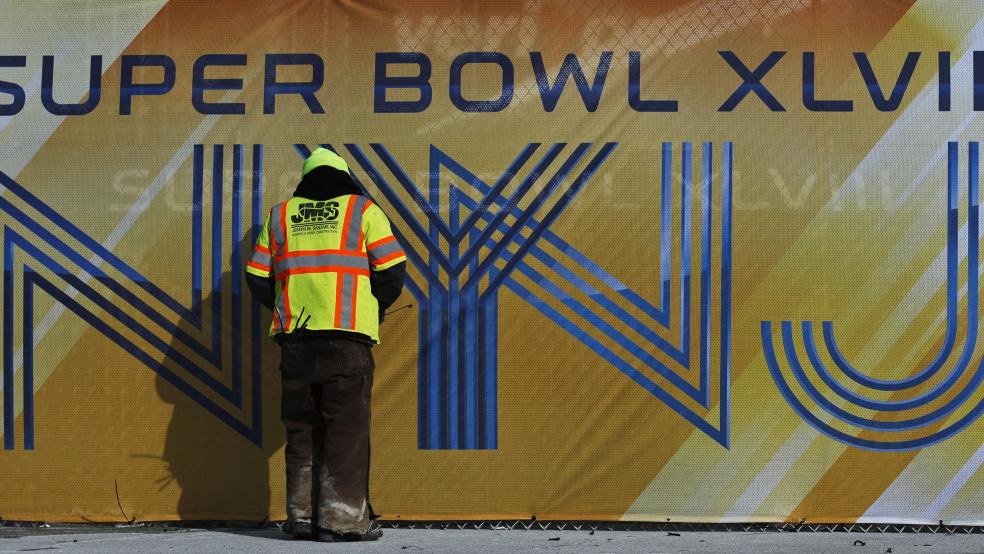Jersey pride, the sense of civic honor felt by residents of the Garden State, has taken a real beating lately.
First, it was Chris Christie and “bridge-gate.” New Jersey may be “Stronger Than the Storm,” as the governor reminded everyone repeatedly in a marketing campaign after the $35 billion in damage inflicted by Sandy, but Christie’s 2016 presidential ambitions may not be stronger than a traffic scandal.
Now, it’s Super Bowl XLVIII. When the NFL decided to break precedent and award its championship game to the New York City/New Jersey metropolitan area (it was a joint bid), officials were ecstatic. A joint statement from Sens. Chuck Schumer (D-NY) and Bob Menendez (D-NJ) proclaimed: “As the nation’s most populous metro area with more than 19 million people, and as the nation’s top media market, the fanfare of the Super Bowl would be uniquely enhanced by the vibrancy that the region has to offer.”
Related: The Super Disappointing Economics of Super Bowl XLVIII
The fanfare, so far, has some folks in the Garden State feeling slighted — again.
Football fans nationwide may be eager to see a championship matchup between the NFL’s top offense and its best defense, but those in the Tri-State area know that the biggest rivalry surrounding the game is the one between New York and New Jersey. The Super Bowl has brought up long-simmering resentment of some on the Jersey side.
“For more than a couple of centuries the state has lived in the shadow of one of the world’s biggest cities,” says Ben Dworkin, director of Rider University’s Rebovitch Center for New Jersey Politics. “I don’t think it’s an inferiority complex as much as annoyance that the media doesn’t recognize that we’re not just a suburb of New York and Philadelphia…[People’s] Jersey pride and backbone gets stretched when they feel we are getting dismissed.”
The real football-related action is all happening in New Jersey. Sunday’s game will be played in the $1.6 billion Met Life Stadium in East Rutherford, NJ. Players from both the Denver Broncos and Seattle Seahawks are staying in the Garden State, away from the bustle and temptations of New York City.
Yet, according to East Rutherford Mayor James L. Cassella, the NFL hasn’t put up banners in his town of 8,978. The league has, by contrast, promoted the game along Broadway in the Big Apple, where the population total has a few more zeroes at the end. Casella was worried that this omission may encourage out-of-town fans to bypass New Jersey hotels in favor of ones across the Hudson River.
“People will get the idea that they have to be in New York to attend the game and participate in the pre-game festivities,” he said, adding that there will be a game-day celebration in East Rutherford. “I think it’s disrespectful” to New Jersey. To make matters worse, Fox broadcaster Terry Bradshaw made frequent references to the game being in New York, which earned of the ire of the Jersey faithful on Twitter.
Related: The Other Really Big Battle at Super Bowl XLVIII
A spokesman for the NFL couldn’t immediately be reached.
“The Super Bowl wouldn’t be here without both states,” Al Kelly, president of the host committee reportedly said at a press conference this week. “I think there’s a pretty darn good balance, and I think the league and the host committee are proud of that.”
Even the most prideful residents of the Garden State realize that were it not for its proximity to New York, the NFL wouldn’t have broken with its decade-long precedent of only awarding the Super Bowl to cities where the weather is warm or have stadiums with domes.
The football world apparently is trying to make peace with Cassella. After reports that the Super Bowl Committee neglected to give him a ticket to the big game, Colts owner Jim Irsay provide him with two. Meanwhile, New York Mayor Bill De Blasio plans to watch the big game at his home in Brooklyn, a decision the Associated Press noted “is in line with the image he crafted during his campaign: that he was a middle-class family man focused on fixing the city's widening income inequality.”
Once the NFL champion is crowned, Cassella’s attention will eventually turn away from the gridiron to East Rutherford’s balance sheet.
“We don’t know what it’s going to cost at this point,” Cassella says. “What we are hoping is that the increase in the hotel occupancy tax will help off-set any costs that we will incur,” he said.
Top Reads from The Fiscal Times:
- Super Bowl – Best Excuse Yet to Buy a New TV
- Why Bad Weather Makes You a Better Worker
- The NFL's $1 Billion Headache Isn't Going Away

